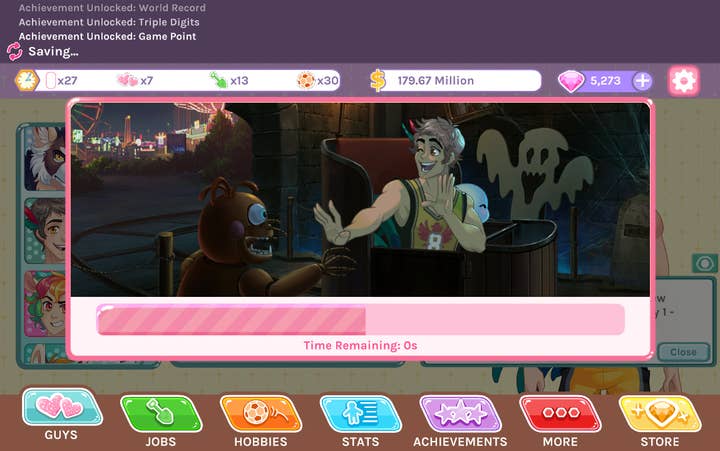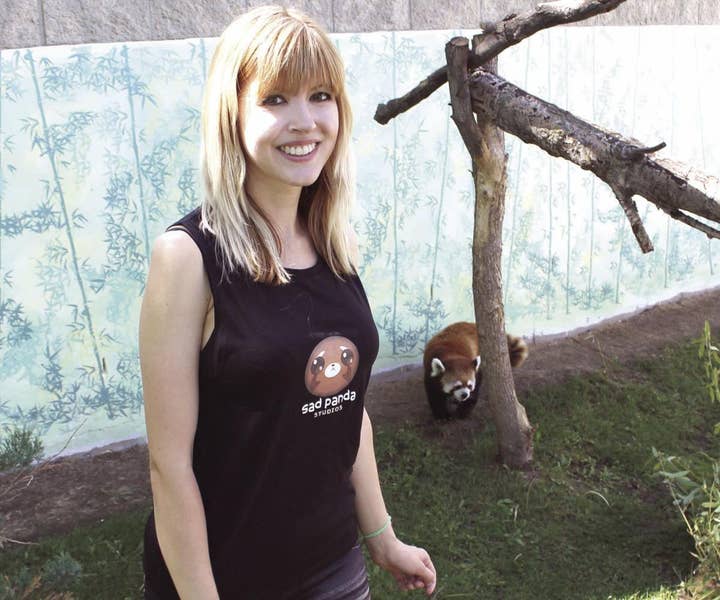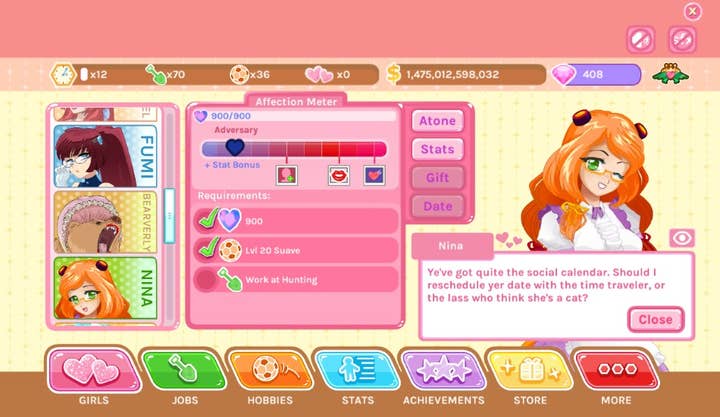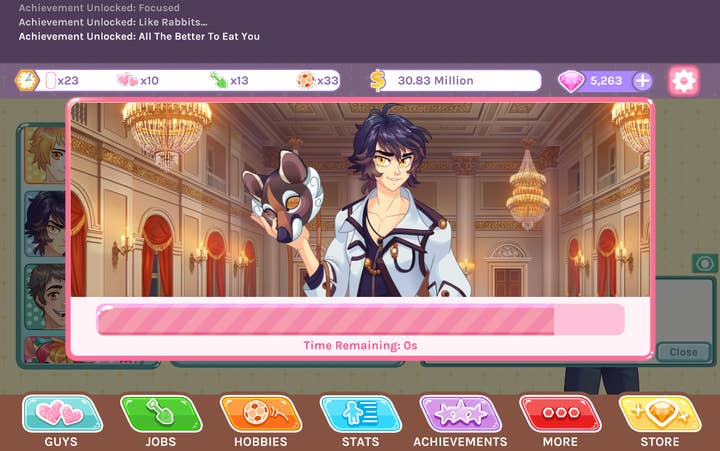Crush Crushing stereotypes with adult games about everyday people
Nutaku and Sad Panda Studios talk about the stigmas still facing adult and dating games, and the importance of visible women creators
Nutaku is acutely aware that there are stereotypes surrounding games about sex, dating, and even just romance. And the Adult gaming platform is interested in proving at least some of those stereotypes wrong -- through its developers.
A key point, says Nutaku marketing and communications manager Jeyson Acevedo, is that adult games aren't just a bunch of heavily sexualized women in games targeted toward men. In fact, reaching gender parity in its user base is one of Nutaku's goals as it grows, with games like Sad Panda Studios' Crush Crush and Blush Blush helping it to get there.
"Our audience is majority male, but we are reaching a point where we want to ensure that we have not just inclusive games on our platform, but also that we are being open to hearing feedback in terms of the games that we're putting on Nutaku," Acevedo says. "So at this point, we can say that a 35% ratio of our worldwide audience is female. Games like Crush Crush and Blush Blush are super important to us, and dating sims are our most popular games on the platform, which just contributes to that effect."
"It's easy to put a cute girl in a warrior bikini and call it armor. But we didn't care about doing that sort of fan service"
Morgan Long
Acevedo says Nutaku is still a young company that offers a specific type of adult entertainment, but one way it tries to foster a more diverse audience is by ensuring a diversity of experiences on the platform, and making sure those experiences are high quality. If Nutaku can provide content made by and made for people of different genders and sexualities, he says, those people will turn up and stick around.
Enter Sad Panda Studios, a team formed around five years ago by a few friends who hacked together a mix between an idle game and a dating sim in their spare time. The studio gradually grew to a team of 18, and it's since gone on to build a spin-off aimed at female players called Blush Blush.
Most of the studio's creative team working on both Crush Crush and Blush Blush -- and a total of 11 of the studio's employees -- are women, a point that Sad Panda CEO Morgan Long believes contributes to its game having a generally more even ratio of men to women in the audience.
"I think because the creative team is majority females, we're really pouring in the sort of things we want to see in these games," Long says, speaking to GamesIndustry.biz along with other Sad Panda team members. "When Carmen [artist on Crush Crush and Blush Blush] I are brainstorming, we're coming up with funny stuff and romantic stuff that we'd want to see in the game. So there's a larger portion of female players because we made the games for ourselves.

"...I think a lot of dating games I've observed pander to the hyper-sexualization of ladies. It's easy to put a cute girl in a warrior bikini and call it armor. But we didn't care about doing that sort of fan service; we wanted to craft the characters first. And they are really attractive, but they also have a lot of substance to the personality too. And I think the writing is a big part of that."
Though Long didn't specifically go out of her way to seek women when looking for other creators to work on Crush Crush, she found diverse, talented creators who were excited about the content. And Long is passionate about the role visible, women-led games can play in encouraging other women to get their start in the industry, which she says in turn will result in more diverse content that will appeal to even more women, and so forth.
"It's a lot harder to attract female talent, because as soon as you hear 'dating' you think 'risque' and there's a stereotype associated with that"
Morgan Long
"I wish there was more information out there when I was younger, because I think part of the problem is that girls just don't know," she says. "They don't know they can get into games. They don't know what those roles are. It's really cool to see these hackathons and these girls coding camps, but I still think there's a lot more that could be done. Even having ladies in the industry coming forward and speaking out being leaders for this new wave of people who are getting into the industry would be fantastic.
"I think for dating games specifically, it's a lot harder to attract female talent, just because as soon as you hear 'dating' you think 'risque' and there's a stereotype associated with that."
Cody Vigue, who does game design and writing with Sad Panda, adds: "Something that's kind of incredible about the game industry is that even though there are these multi-billion dollar companies involved with it, it's still a very power-decentralized medium. You can have a little indie team of like one, two, three, or four people put out a game that sets the whole industry on fire. That and the fact that games tend to invite people of any discipline -- whether you're an engineering mindset, a creative mindset, we even need production people, people who are managerial and good at working with people -- there's literally a role for everyone in a game development situation.
"I feel like when I was a kid and I was interested in video games, that ability just didn't exist. You couldn't just say 'I want to pick up making video games.' All the studios were in Japan and blah blah blah. Now I feel like the message is that anyone can make it in the industry, and small games can still have a massive impact. You can't really start a blockbuster movie in your garage with your friends, but you can start a game studio."

And Carmen, an artist with Sad Panda, concludes: "We're still fighting against stereotypes. But social media has been really incredible in that you're starting to see representation come forward where there are more people coming over and being like, 'Hey, this is what I do, I work in games.' When I was first entering the industry, it was very male-sided, and there was no real way to find those people you could connect with. As it gets more diverse, we're starting to see those representations come out in games, which is encouraging to kids where they see themselves. It's not just Mario and Luigi.
"A talk that I recently went to was with another game designer talking about their game. They mentioned that it is also a responsibility for people who are working in games, especially if in your leadership position, not to just assume that you know all points of view. It's not just if you're making a female character, making sure that you're reaching out to a woman and talking about what you can put into that character. But for anything -- if you're making a character of a different race, or if you're making a [character from a] different culture, or if you're making a [character with a] different sexuality or an orientation, reach out to those people and get input."
Long had mentioned that dating games struggle to attract female talent due to perceptions, and adds later that perceptions around adult games and even just dating games broadly can cause all kinds of issues. For one, it can be hard to find voice actresses. Sad Panda is upfront with potential actors about there being particular kinds of adult content they'll have to voice, but it's willing to work closely with artists and potentially rewrite things. The same goes for artists, with portraying nudity.
"Social media has been really incredible in that you're starting to see representation come forward"
Carmen
Even so, some talented creators won't touch adult content at all. While some of that is down to personal comfort, some of it is also just due to perception -- where anything with nudity or sex is seen as "sleazy." In another example, Vigue points out that content guidelines on platforms outside of Nutaku are often applied more aggressively to games that market themselves as dating simulators, even where the content itself is relatively tame.
"There are plenty of games on, let's say, iOS and Android, where there's quite a bit of explicit content," he says. "Like in an RPG, characters are hyper-sexualized, there's lots of cleavage, but because the game is not explicitly about relationships, they're allowed to sidestep the guidelines. It's okay that this barbarian woman is almost nude because she's a barbarian woman.
"Meanwhile, our characters are dressed like normal people, they talk like normal people, and because the objective of the game is relationships and dating, we are very heavily scrutinized. Certainly far more than I've seen games which I would consider to be underlying misogynistic -- like there's a game where you're a king and you sleep with as many concubines as you can.
"We've had our game up and we'll be doing fine, then suddenly we'll get hit with a reviewer saying a girl has too much cleavage. It's just a normal shirt she's wearing, and okay, we'll tone it down. But it's frustrating that it's the underlying action of a game that is actually what provokes a restriction, when there's certainly other games which utilize sex in their advertisements, and in their curb appeal."

Acevedo notes that society at large still doesn't understand how to talk about sex, and games in particular struggle with having that discussion. Nutaku, while known as a platform for adult games, is doing what it can within its platform to demonstrate that adult games don't have to be just about sex. And Vigue adds that though the stigma can be frustrating, he is confident that acceptance will improve with time.
"Our characters are dressed like normal people, and because the objective of the game is dating, we are very heavily scrutinized"
Cody Vigue
"Games as a medium are still pretty young," Vigue says. "The industry as we understand it started essentially in the 80s. And 100 years ago, no one would have imagined that television would evolve to where we have networks like HBO, which put out very visceral or graphic content and win tons of awards and are taken very seriously.
"If they put a sex scene in a game, like Mass Effect -- which is two consenting people, they're in love, you have to play like 12 hours into the game to get to that point, and you actually have to pursue a platonic into a romantic relationship with that character, it's very purposeful -- it makes the news and everyone's like, 'This game lets you have sex with an alien!'
"Sex is obviously a normal part of human dynamics. It can have its own role in story and narrative creation and characterization. So by making games like Crush Crush which are simultaneously gentle, but also treat the whole thing as normal, we're doing our small part to push that perception."
Long also adds that while there's a long way to go toward acceptance of adult games, Steam recently loosened its guidelines to allow more of the genre on the platform, and Nintendo has even begun to loosen its restrictions on visual novels. However, she worries that mainstream games media is too focused on either promoting games with "gimmicks" like Hatoful Boyfriend or the KFC Dating Simulator, or on controversial products.
But for Crush Crush and Blush Blush, Long says she is happy with Nutaku, and that it's been a healthy platform for Sad Panda with an easy-to-use interface, convenient age gates, and a relatively non-toxic social space.
"We're feeling good about the places we have our games, though it's only Nutaku and Steam for the more mature versions," Long says. "But we're really happy with that. And if more sites are going to enable more of an adult side, that's pretty cool. It went from really hard a few years ago [to find a place to publish adult games], to now it's on Steam, and now it's in more places. That's a positive thing."

